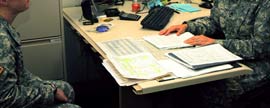Receiving an Article 15 is a significant emotional event in a Soldier’s life. Leaders sometimes forget how difficult these times can be for Soldiers and their families. While correcting substandard performance is important, it is equally important to plan for the future.
We must make every effort to ensure Soldiers understand they can overcome this event and become a productive member of the team. Conducting an effective counseling session before and after the Article 15 procedure will help the Soldier understand what has happened, why it happened, and how they can move forward in a positive manner. Each level of leadership is responsible for setting the Soldier up for success. The Soldier is responsible for implementing a positive change. With these thoughts in mind I would like to offer the following guidance for dealing with a Soldier facing an Article 15 proceeding:
Counseling before the Article 15
- Be professional
- Ensure the Soldier understands the Article 15 is not personal
- Be empathic
- Ensure the Soldier understands the importance
- of accepting responsibility for their actions
- being honest
- not making excuses
- Properly prepare the Soldier by having them get statements or ensure witnesses are available for the Article 15 process.
- Explain to the Soldier how the process works.
- Ask the Soldier to think about a punishment they believe would be appropriate (if found guilty). Soldiers can be very hard on themselves and be very inventive with punishments that are meaningful.
- Talk to the Soldier about preparing a statement to read at the Article 15 proceeding.
- Explain to the Soldier how to present matters of extenuation or mitigation.
- If the Soldier is married ask them to speak with their spouse about the potential punishments and how they could effect family life and family finances (less time with family, loss of pay, etc)?
Counseling after the Article 15

An Article 15 is a significant event in a Soldiers career, but they'll pick themselves up much faster with proper support.
After an Article 15, the Soldier is typically down and not exactly feeling their chipper self. Consider the following items:
- Regardless of the situation let the Soldier know
- You care
- While life is hard now (especially if they are losing a stripe, being chaptered, or being barred), its not the end of the world.
- Build the Soldier up if at all possible. In some situations this may be difficult depending on the demeanor of the Soldier and the situation.
- Ensure the Soldier knows they can call you for guidance and support.
- Provide contact information for the chain of command to the Soldier.
- You may not know everything that is going on with a Soldier. There may be problems at home, on the job, or financial troubles. The completion of the Article 15 process (realization of punishment) may be the straw that pushes the Soldier over the edge in terms of depression or other actions.
- Don’t be proud of punishing a Soldier!
- Tell them to put the experience behind them, learn from it, grow from it, and teach others to learn from their mistakes.
- Let the Soldier know you expect them to:
- Maintain the standards
- Complete punishment as required
- Be professional
- Let them know you will not hold this incident against them if they correct the substandard performance but if they choose to continue substandard behavior/performance you will utilize the previous Article 15 for actions like: bar to reenlistment or chapter actions.
- Typically the Soldier will feel bad after the Article 15, don’t do anything to increase this. It’s a good idea to show compassion rather than risk increasing their stress level.
- Tell the Soldier to go home and talk to their spouse and explain the situation and punishment.
Bottom-line: Ask them to remember the experience because one day they will be a leader making the difficult decision to punish a Soldier, and their decision will effect one or all of the following with regard to the Soldier:
- Life
- Family
- Finances
- Career
- Emotions
The soldier should walk away from the process educated and understanding that the leadership cares but will enforce discipline.
If the Soldier walks away with an attitude and a feeling they have been treated unfairly odds are the problem has not been properly addressed. In most cases you can get through to a Soldier. In some cases the Soldier may not be able to see the bigger picture. You can only hope that as time passes the Soldier will see you were fair.
In all cases monitor your Soldiers closely (before, during, and after).
Read The Mentor: Everything you need to know about leadership and counseling for more information about Counseling, Leadership, Corrective Training, and Separations in the Army.















Comments
SGT Rod
Can a soldier receive an article 15 even if that soldier never received an initial counseling from their first line supervisor?
Mark Gerecht
SGT Rod,
Yes a counseling statement is not required to recommend UCMJ. Think about it this way. If a Soldier commits an act punishable by UCMJ there is no requirement to counsel the Soldier. The leader can simply request an Article 15.
Hope this Helps